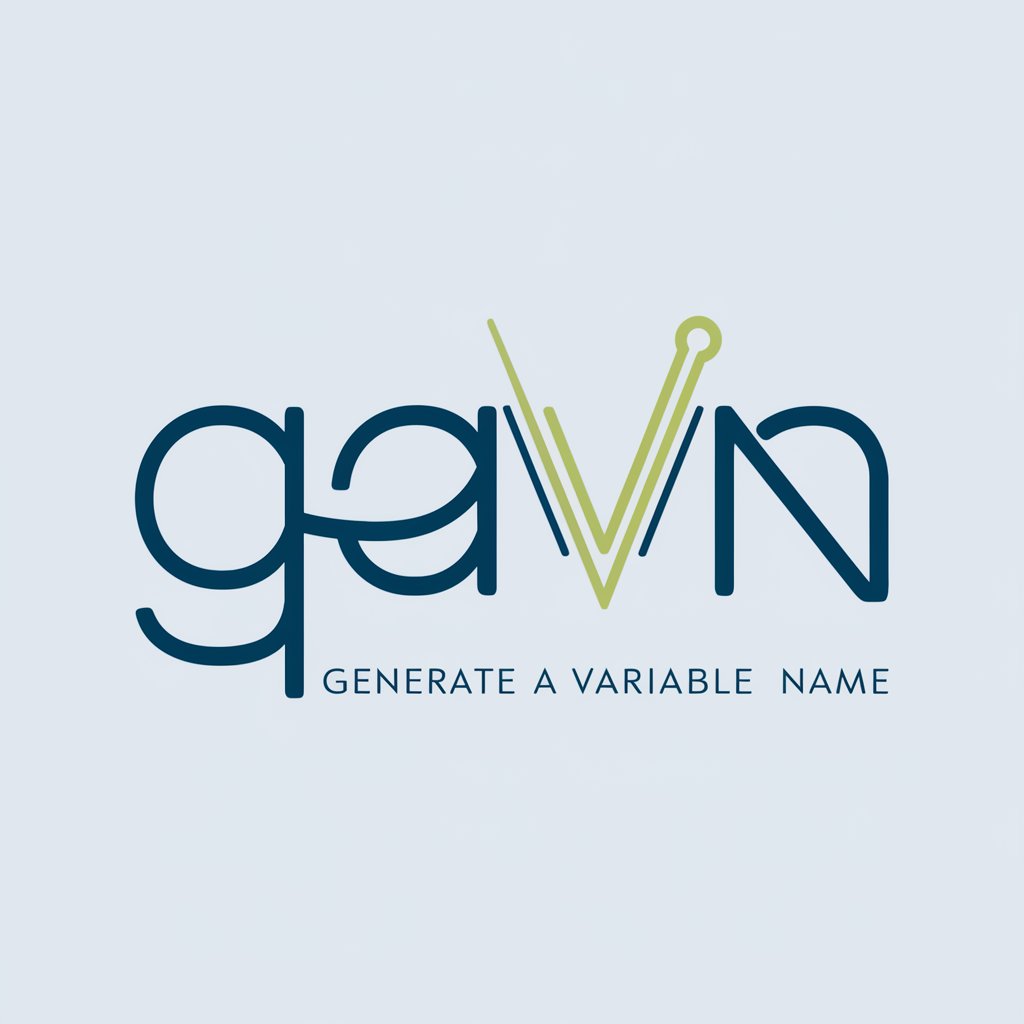Generate a variable name - Variable Naming Tool

Hello! Need a precise variable name? Let's get started!
AI-powered Naming for Clean Code
Translate the following Japanese phrase to English and convert it into a suitable variable name:
Generate a lowerCamelCase variable name from this Japanese input:
Create a programming variable name based on this Japanese phrase:
Convert the provided Japanese text into an appropriate lowerCamelCase variable name:
Get Embed Code
Overview of Generate a Variable Name
Generate a Variable Name is a specialized AI-driven tool designed to convert natural language descriptions into appropriate variable names for programming. This tool translates the input from Japanese into English, identifies the most relevant terms, and then formats these terms into lowerCamelCase variable names, which are commonly used in programming languages like JavaScript, Java, and many others. The primary purpose of this tool is to streamline the coding process, making it easier for developers to name variables consistently and meaningfully without spending excessive time pondering over naming conventions. Powered by ChatGPT-4o。

Core Functions and Use Cases
Natural Language Processing
Example
userInput to userInput
Scenario
When a user inputs 'ユーザー入力', the tool translates it to 'user input' and then generates the variable name 'userInput'. This function is especially useful in situations where developers are trying to name variables based on descriptions of data or actions.
Adherence to lowerCamelCase Convention
Example
monthlySalary to monthlySalary
Scenario
Given a description like '月給', the tool first translates it to 'monthly salary' and then converts it into 'monthlySalary'. This ensures that the variable names are not only meaningful but also follow a widely accepted naming convention, making the code cleaner and more readable.
Optimization for Readability
Example
finalScoreAfterAdjustment to finalScoreAfterAdjustment
Scenario
For inputs that describe complex concepts, such as '最終スコア調整後', the tool generates variable names like 'finalScoreAfterAdjustment', which clearly convey the variable's purpose while maintaining readability and adhering to naming conventions.
Target User Groups
Software Developers
Developers who frequently engage in coding activities and seek to improve code readability and maintainability through consistent naming practices would find this tool immensely beneficial. It saves time and ensures that variable names are descriptive and conform to standards.
Programming Students
Students learning programming can use this tool to understand how to name variables properly. It serves as an educational aid, helping them adopt best practices in coding right from the start.
Non-English Speaking Programmers
Programmers who are non-native English speakers and might struggle with translating their thoughts into English variable names can leverage this tool to bridge the language gap, ensuring their code is accessible and understandable to a global audience.

How to Use Generate a Variable Name
1
Access the tool easily by visiting yeschat.ai, where you can start a free trial instantly without the need for signing in or subscribing to ChatGPT Plus.
2
Input your variable naming requirements in Japanese, clearly describing the purpose or context of the variable.
3
Review the translated English version of your input for accuracy, making any necessary adjustments to ensure clarity.
4
Submit your request, and the tool will generate a suitable variable name in lowerCamelCase format, adhering to common programming conventions.
5
Copy the generated variable name and implement it in your code, ensuring it accurately represents its function or value within your program.
Try other advanced and practical GPTs
Puzzle Master
Unleash your intellect with AI-powered puzzles

Quran Expert
Unlocking Quranic Wisdom with AI

デフォルメキャラメーカー
Turn images into chibi characters effortlessly.

PósGeografiaBR
Explore Geography Research with AI

Logo Designer
Craft Your Brand's Identity with AI

MuskBot
Explore Elon's World, AI-Powered

Design GPT
Elevate your design with AI insights.

茶叶包装设计
Craft Unique Tea Experiences with AI-Powered Packaging Design

Style Sketcher
Visualize Your Style with AI

Logo Creator
Craft Your Brand's Identity Seamlessly

Signal Processing Mentor
Empowering your signal processing journey with AI.

MBTI Tester
Discover Your Personality Type with AI

Frequently Asked Questions about Generate a Variable Name
What is Generate a Variable Name?
It's a tool designed to convert Japanese descriptions into suitable, conventionally formatted variable names for programming.
How does the tool ensure the generated variable names are appropriate?
The tool translates the input from Japanese to English, refines the terms for clarity and relevance, and formats the output in lowerCamelCase, adhering to programming standards.
Can Generate a Variable Name handle complex naming requirements?
Yes, the tool can process detailed descriptions and generate variable names that reflect nuanced functionalities or contexts.
Is there a limit to how many variable names I can generate?
While there might be some limitations based on server capacity and fair usage policies, the tool is designed to accommodate multiple requests effectively.
How can I ensure the best results when using Generate a Variable Name?
Provide clear, concise descriptions of the variable's purpose or context, and review the translated input for accuracy before submission.
